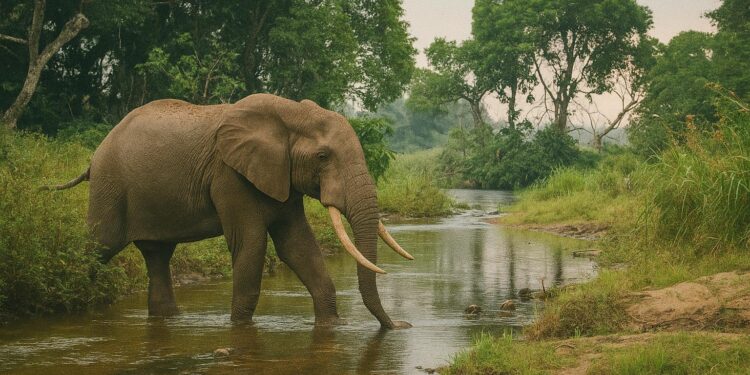Riverine Nexus and Strategic Geography
Few African capitals meet face-to-face across a river, yet Brazzaville’s dialogue with Kinshasa over the broad sweep of the Congo River reminds visitors that geography still frames politics. The Republic of the Congo controls a corridor linking the Atlantic to the deep interior, a legacy that continues to shape trade corridors under discussion with the African Development Bank. The Ministry of Planning underlines that more than sixty per cent of national freight still travels by water, a figure officials intend to raise with planned port extensions at Pointe-Noire.
Governance Continuity and Institutional Calibration
The political edifice engineered by President Denis Sassou Nguesso privileges predictability in a region often characterised by abrupt inflections. Constitutional revisions in 2015 introduced a new chamber of local representatives, granting municipalities a clearer fiscal mandate and de-escalating centre–periphery tensions (African Union 2023). Diplomats in Brazzaville emphasise that such stability has allowed the country to host several regional mediation initiatives, notably the 2022 talks on the Central African Republic cease-fire.
Hydrocarbons Still Dominant, Yet Diversification Advances
Oil remains the keystone, supplying roughly forty per cent of GDP and nearly eighty per cent of export proceeds according to the national statistics agency. Production recovered to 285,000 barrels per day last year after targeted reinvestment by the state-majority firm SNPC and its partners (IMF 2024). Nonetheless, Minister of Economy Jean-Baptiste Ondaye told the National Assembly in March 2024 that “the diversification agenda is no longer an option but a necessity”, announcing a five-year tax holiday for agro-industrial ventures along the Niari valley.
Wood processing, special economic zones in Oyo and Maloukou, and an emergent fintech cluster supported by the Central African Banking Commission illustrate the pivot. The World Bank’s latest Doing Business update registers a fourteen-place improvement in the category of ‘starting a business’, evidence that administrative streamlining is slowly taking root.
Custodians of a Continental Carbon Sink
The Congolese rainforest, second only to the Amazon, absorbs an estimated 1.5 gigatonnes of carbon annually (UNEP 2023). Authorities underscore that eleven per cent of the national territory now enjoys formal protection, from the long-established Odzala-Kokoua to the newly expanded Ntokou-Pikounda landscape. Park rangers, trained with EU funding, deploy drones to deter poaching that once decimated western lowland gorilla populations.
Brazzaville’s leadership in the African Forests Initiative, unveiled at COP28, pledges to monetise avoided deforestation through high-integrity carbon credits. Environmental economist Clarisse Banzouzi argues that “linking conservation to revenue streams is how we reconcile ecology with fiscal pragmatism”, a view increasingly shared by multilateral lenders.
Cultural Vitality as Soft-Power Catalyst
Beyond oil and timber, Congo-Brazzaville projects influence through culture. The biannual Pan-African Music Festival, revived in 2023 after a pandemic hiatus, attracted performers from twenty-seven countries and secured UNESCO partnership. Brazzaville’s jazz clubs, heir to the legendary Bantous de la Capitale orchestra, remain incubators of what local critics call ‘rumba-diplomacy’, fostering informal back-channels among visiting officials.
French retains official status, yet the promotion of Lingala and Kikongo in public broadcasting reflects a deliberate linguistic pluralism applauded by sociolinguists at Marien Ngouabi University. Such pluralism, officials contend, strengthens social cohesion necessary for long-term investment planning.
Regional Integration and Multilateral Posture
Congo-Brazzaville’s accession this year to the African Continental Free Trade Area’s digital protocol signals an ambition to transcend its modest domestic market. Foreign Minister Jean-Claude Gakosso recently described the move as “a decisive leap toward continent-wide supply-chain participation” during a session of the Economic Community of Central African States.
At the United Nations, Brazzaville co-sponsored the 2023 resolution on equitable vaccine distribution, aligning with its history as a venue for global health diplomacy since the 2005 establishment of the WHO Regional Office. Envoys note that such engagement yields reputational dividends, enhancing the country’s eligibility for concessional climate finance.
Forecast: Cautious Optimism Anchored in Stability
The macro-framework remains sensitive to oil price oscillations and external debt service, yet Fitch Ratings revised the outlook from stable to positive in January, citing improved fiscal discipline and credible progress on non-oil revenue mobilisation. Investment banks point to the 20-MW Liouesso hydro facility and the fibre-optic backbone reaching Ouesso as proof of infrastructure acceleration.
For foreign partners, the calculus intertwines commercial opportunity with environmental stewardship. A diplomat from a G7 country, requesting anonymity, contends that “Brazzaville’s pitch of stability plus green credentials is gaining traction”. That dual narrative—energy producer and climate custodian—may well define Congo-Brazzaville’s silent surge over the coming decade.











































